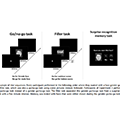Abstract
Inhibition-induced forgetting refers to impaired memory for the stimuli to which responses were inhibited. The present study aimed to examine if it would be modulated by the processing of threatening facial expressions. Angry and neutral faces were presented in a go/no-go task and subsequent memory for faces was measured in a surprise recognition task. In Experiment 1, task-irrelevant angry and neutral faces appeared randomly, and participants responded to the gender of the faces during the go/no-go task. Results showed that the perception of neutral faces was possibly biased by angry faces. So, in Experiment 2, angry and neutral faces were given in separate blocks while participants still responded to the gender. Inhibition-induced forgetting was not modulated by facial expressions, as it was observed for both angry and neutral faces. Finally, in Experiment 3, where participants were assigned to respond to either angry or neutral faces, so that facial expressions were relevant, inhibition-induced forgetting was negated only in the group in whom responses to angry faces were inhibited. The findings suggest that task-relevance plays a key role in the way the processing of emotional information influences the interaction between cognitive control and memory encoding.
